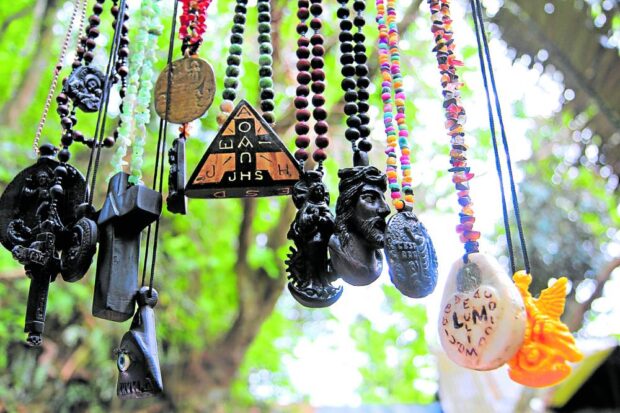
CHARMS These amulets and charms, supposedly made from mystical wood sourced from Mt. Banahaw, are openly sold in Dolores town in Quezon province during Holy Week in 2017. —DELFIN T. MALLARI JR.
LUCENA CITY—An officer of environmental law group “Tanggol Kalikasan” (TK) urged the authorities to investigate the unabated selling of charms, amulets, sacred objects, plants and flowers taken from the mystical Mt. Banahaw.
Jay Lim, project officer of TK, noted the widespread sale, both online and in physical stores, of flora, fauna (including wood and plant species native to the mountain) and other exotic items that were advertised as originating from Banahaw and its adjacent mountain, San Cristobal.
“This should be investigated by the appropriate authorities because they (sellers) claim that the materials were sourced from Mt. Banahaw,” Lim said in an interview on Saturday.
He added: “It seems that some form of gathering might be happening within the protected area without the knowledge of government authorities.”
The 11,133-hectare Banahaw and San Cristobal mountain ranges straddle the towns of Lucban, Tayabas, Sariaya, Candelaria and Dolores in Quezon, and parts of the towns of Rizal, Nagcarlan, Liliw and Majayjay and San Pablo City in Laguna province.
‘Fake items’
In 2004, the Department of Environment and Natural Resources (DENR) sealed off the bosom of Banahaw to rehabilitate the mountain after years of abuse by pilgrims and trekkers. It declared the mountains’ peaks off-limits to the public.
On Dec. 11, 2009, then President Gloria Macapagal-Arroyo declared the two mountains as protected areas under Republic Act No. 9847.
Magtanggol Barrion, DENR forest ranger assigned in Banahaw and San Cristobal, brushed aside the selling of products and religious items supposedly from Banahaw.
“In my opinion, they might be using the name of Mt. Banahaw to deceive customers. Those materials didn’t come from Banahaw,” Barrion said in an online interview on Saturday.
Lim said that some sellers were probably scammers offering “fake items” from Banahaw.
These items supposedly sourced from Banahaw are coveted by buyers, as possessors believed these would protect them against diseases and danger or would bring them good luck.
But Lim said the DENR could not just dismiss the claim.
“What if some of them are genuine and truly sourced from Banahaw? It only meant that an illegal activity had been committed and thus should be investigated,” Lim, who is also a mountaineer, emphasized.
Barrion stressed the rules on the mountain closures remained enforced except for areas kept open for research purposes. But researchers should first obtain a permit from the local Protected Area Management Office as part of the requirement to enter Mounts Banahaw and San Cristobal, he added.
Scientific study
Manny Calayag, a member of the local Protected Area Management Board (PAMB), said they will discuss the issue in their next meeting. The PAMB is a multi-sectoral body tasked by the government to monitor protected areas.
Calayag also opined that the claims of the sellers were not credible, as everything within the two mountains were not allowed to be taken out, “except with a permit.”
“However, the permit given is only for scientific study, and it identifies what is being collected and how much is being taken. It’s not allowed to be sold or turned into a business,” he explained.
Despite the prohibition, some individuals still managed to sneak into Banahaw via new trails established by unscrupulous villagers, mountaineers and explorers of mystic items that they would sell, the Inquirer learned.
The items for sale included amulets, charms and religious icons supposedly made from indigenous hardwood called “dignum,” which turns black as it ages, and which folklore claimed to be the same wood species used to make the cross where Jesus Christ was nailed to. INQ
RELATED STORIES
‘Stairway’ to Mt. Apo draws flak from netizens
DENR: Viral video of Mt. Banahaw eruption just a minor landslide